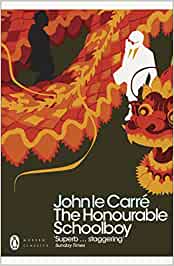OK I GIVE UP
The Honourable Schoolboy

The second book of the Karla trilogy, The Honourable Schoolboy tells the aftermath of the discovery of a very high-level mole in the Circus, the British foreign intelligence agency. Smiley and his team set out to find an entry into the spy network set up by their rival, the Soviet head of intelligence, by searching for investigations suppressed and cleansed from official record by Haydon the mole. They come up with one money transfer operation, the cash ending in the hands of a Hong Kong-based opium dealer. In order to follow this thread, an ex-spy who did not work during Haydon years with the Circus is called back from Tuscany, where he was trying to write a novel, to travel to Hong Kong.
I bought the other two books in the Karla trilogy after reading Tinker Tailor Soldier Spy, just two know the rest of the story, and have bragging rights on understanding the plot in case they get filmed like the first book. The Honourable Schoolboy, alas, is a bit on the ‘unfilmable’ side (though you never really know, with the shortage of decent scripts in the recent years). The reason is that the book proceeds the same way spying work proceeds according to one character in the book: Periods of languish and boredom followed by spurts of activity. There are long periods of observation of relatively irrelevant social circumstances (such as rural life in Tuscany) which nevertheless introduce important characters. One could contend that this is Le Carree’s thing – not writing plain spying stories, but real novels with human background. But the episodes of social observation are on the long side, adding to the already lengthy plot. In order to get the suspense back after observational chapters, Le Carre frequently makes use of a certain plot instrument for which literary theorists most certainly have a name I don’t know, and which I will call “hinting at what’s to come”; it is insinuated that things will be radically different from the way they are as a certain scene is portrayed, such as when the relationship of a Westerby and a journalist colleague of his is explained, and then mentioned that they will never see each other again. In this novel, Le Carre uses this tool too often, probably because the length requires him to keep the suspense through some artificial means.
The main factor contributing to the length, though, is that this novel is in fact two novels in one: There is the story of Smiley and his aides foxing out a plan to get a grip on the Soviet spy network, and there is Westerby traveling through war-thorn South-East Asia, carrying out the orders from Circus Central. Westerby’s travels serve as a guide to the havoc wreaked in the region by western powers –especially the US– devastating whole countries and turning them into opium-pits, but they are a bit on the chaotic side. Westerby travels from city to city, country to country, and at some point, the reader loses the thread of where he is and what he is doing. My suspicion is that this traveling mainly serves as a plot tool to display the workings of the US-American security and military machinery, providing a critical backdrop to their (later ominous) cooperation with MI6, but the change in Westerby’s psychological makeup through them is also significant and grounds the events in the last pages of the book.
Despite its shortcomings, The Honourable Schoolboy is a Le Carre novel with all the niceties that can be expected. There are a lot of interesting plot twists and revelations, and examples of how spies trick and cheat and work. If this is your thing, I would highly recommend the novel, but if you’re not a big fan of spy novels, it might turn out to be too long for you.